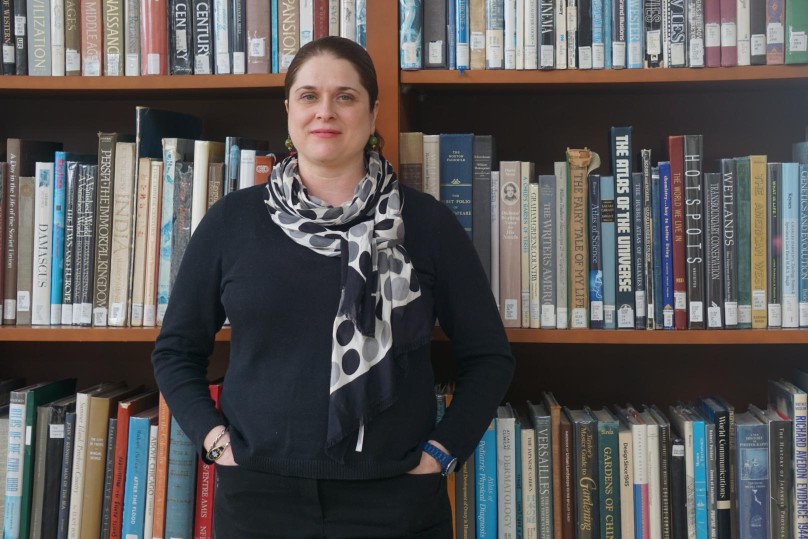Diane Bockrath, Arcadia’s First Archivist

Diane Bockrath is Arcadia’s first professionally trained archivist and cataloguing manager, and has held that position for a year and a half. She holds a BA in International Relations from University of Delaware and a Master of Liberal Arts degree from The Johns Hopkins University. After discovering her passion for archiving, she got her Masters in Library Science from University of Maryland College Park.
How did you develop an interest in archiving?
Archiving is my second career. I had a whole first career in marketing and communications. Through Johns Hopkins’ Liberal Arts program, I took a course called “The History of the Book in the West,” taught at the Walters Art Museum in their Manuscripts and Rare Books department. I walked into the rare-book room and just completely fell in love. I told myself, “This is what you should’ve done this whole time, dummy!”
What made you choose Arcadia?
Arcadia is in an interesting position with its archives. Arcadia kept its archives in the storeroom, and it wasn’t very open or accessible and not catalogued. So that offered an interesting challenge. There’s a good collection of stuff here; it’s just that we [Arcadia’s staff] want to take the stuff in this room to the next level.
We’ve been looking after all of our archival material the same way we look after, say, grandma’s photographs. We want to change keeping grandma’s photographs in the attic to a fully robust research collection that’s tied to what we do in terms of teaching, so classes can use it and there’s a connection between curriculum in various classes.
What are your principal duties as archivist? What precautions do you have to take while handling the archives?
The challenge really is how you provide access to old stuff without it falling apart. To maintain the archives, we take care of the environment where the archives are kept, making sure it doesn’t get too humid or too hot or too cold or too damp. We make sure pests stay away, make sure things don’t stay out for too long and get faded in the light. Although there is no conservation lab at Arcadia, we can send things for conservation. Digitalization can help with preservation. There are times when you can get a lot out of a digitized image, but there’s nothing like the experience of seeing the thing in person. So it’s a balance between providing access to information and giving people the experience of interacting with the original object.
What role do you think archives should play in a university?
I’m going to be a little bit biased, of course, because I want to shout and say it’s the most important thing! Particularly for a university like Arcadia, I think it plays a very important role because our new president, Dr. Nair, speaks passionately about helping Arcadia find its voice and find its role. There are a lot of small colleges and universities in this area, and we need to find some of the things that make Arcadia really stand out for students, researchers, and professors. I’m so glad that our new president seems to recognize this.
Arcadia was founded as Beaver College in 1853, but there’s a lot to be discovered about Arcadia’s early history. I would argue that we play a much more prominent role in the development of women’s early education than perhaps even the historians have realized. Arcadia has an important foundation. It has a beautiful national historic landmark building on campus. The tapestries inside the castle were part of one of the biggest commissions ever produced in this country. All of these things come together to make our own archival resources and heritage stand out.
What’s one of your most interesting finds?
There was actually a pretty long period during the beginning of Arcadia’s history where Arcadia was co-ed. The intention was always to have Arcadia as a robust women’s college. We were always meant to have a strong, rigorous curriculum, which was pretty daring for Western Pennsylvania in 1853, but we had many troubles.
By 1872, we changed our name from Beaver Female Seminary to Beaver College. So when we turned into a college from a seminary, that was a big step up for us in terms of academic rigor and standing. We had three degree paths, one called Mistress of Liberal Arts; isn’t that great? We also had Mistress of English Literature and a music program. Then, there was the boys preparatory program. So everything that the women were studying was at a collegiate level, and the preparatory program for boys was at a secondary, high school level.
Another interesting fact is that Arcadia had a degree in Home Economics. Arcadia used to have a house on campus called the home-ec house. The students in the house would do a six-week long semester, and everybody had a role that they were performing— cook, housekeeper, nanny. They each had a job and had an infant to look after. The baby was borrowed from a local orphanage, which is completely wild— you cannot imagine borrowing a baby.
What interests you the most about this job?
Arcadia has a couple of collections of historic children’s literature, and that’s a particular area of research interest for me. Philadelphia has a phenomenal rare book collection in general. I wanted to bring these collections forward. I’m trying to develop a syllabus now that we’ll try to teach from that collection. I’d like to maybe do a first-year seminar.



